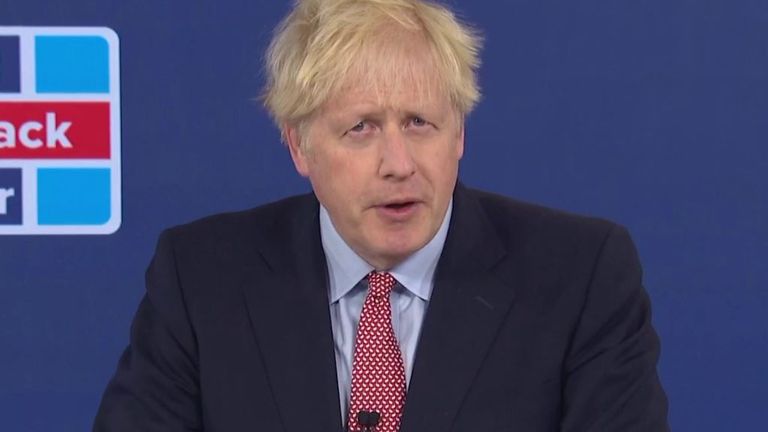Senior politicians from four major northern councils have warned the government that existing coronavirus restrictions are “not working”, describing some as confusing and others as counter-productive.
Their intervention reflects growing divisions in politics and in the scientific community over how to tackle the growing number of infections.
The letter to Health Secretary Matt Hancock was signed by Leeds City Council leader Judith Blake, Manchester City Council leader Sir Richard Leese, Newcastle City Council leader Nick Forbes, and Liverpool mayor Joe Anderson.
The four centres are among the worst-affected areas as the pandemic worsens – the UK reported 14,542 new coronavirus cases on Tuesday, almost 2,000 more than the previous day. Hospital admissions in England also hit a four-month high.
It comes as a new declaration, signed by thousands of scientists, calls for a herd immunity approach while protecting the most vulnerable populations.
In the letter, the four leaders said they were “extremely concerned” about the sharp increase and the “national responses”.
“The existing restrictions are not working, confusing for the public and some, like the 10pm (curfew) rule, are counter-productive,” they said.
Insisting they do not support further economic lockdowns, they instead called for additional powers to punish those who break rules and for any further restrictions to be developed by police, council, and public health experts.
They also called for a locally controlled test and trace system and financial support for those who needed to isolate with a payment that recognises additional needs in areas of deprivation.
“It is critical to the future of our local – and therefore the nation’s – economic wellbeing that we look to work together to deliver a joined up and effective response for our cities and the country in the coming days,” the letter said.
:: Subscribe to Sophy Ridge on Sunday on Apple podcasts, Google podcasts, Spotify, Spreaker
Also mentioned was the need for improved support for businesses, something Liverpool’s mayor emphasised in an interview with Sky News.
Joe Anderson said: “When we had the national lockdown, we had a furlough scheme that was national.
“It seems to me to be common sense and also consistent that if we’re having a local lockdown that impacts on businesses, we should have a local scheme that supports those very businesses. Because otherwise they won’t come back.
“It’s alright the government talking about putting money into retraining packages but we’ve got to stop the jobs from being lost and that will then stop people needing training packages because we’ve prevented those jobs from going.”
He added: “I think the government are in a halfway house here. I don’t think they’ve done enough and they hope it will go away. The bottom line is you have to make a choice – there has to be stricter measures that actually bring the virus to a halt…and that’s why there has to be an economic package of support where that is happening.”
Meanwhile, Professor John Edmunds, who sits on the scientific advisory group for emergencies (Sage), also criticised local measures and said new national restrictions were needed immediately.
Professor Edmunds said the government’s current “light touch” measures are just “delaying the inevitable”.
“We will at some point put very stringent measures in place because we will have to when hospitals start to really fill up,” he told the BBC.
“Frankly, the better strategy is to put them in place now.”
International Trade Secretary Liz Truss told Sky News that the government didn’t want to “have to go back to a national lockdown, where we effectively end up closing down the economy as well as severely restricting people’s lives”.
“So that is why we are having these different series of local lockdowns or local restrictions to make sure that we are tailoring the restrictions to the specific circumstances of each area,” she said.
“Of course that introduces an element of complexity… but these restrictions are based on the best scientific and medical advice.
“We do work with the local mayors – keeping them involved in that process.”
The views of scientists such as Professor Edmunds who support stricter measures are at odds with other academics.
The new declaration, signed by top scientists from the universities of Oxford, Nottingham, Edinburgh, Exeter, Cambridge, Sussex and York, suggests herd immunity as a way forward.
The so-called Great Barrington declaration states: “The most compassionate approach that balances the risks and benefits of reaching herd immunity, is to allow those who are at minimal risk of death to live their lives normally to build up immunity to the virus through natural infection, while better protecting those who are at highest risk.
“We call this Focused Protection.”
Ms Truss said the government was striving to “keep the balance” between those wanting tougher restrictions and those wanting looser measures.
“I think we’ve got the balance right,” she told Sky News.
“Of course we need to be constantly reviewing it as time goes on, making sure the policies are right for each local part of the country.”
“But the fact is, if somebody younger catches coronavirus, then the danger is, of course, them passing it onto somebody else.
“This is a societal disease, this is not something that only affects individuals.”
But the government’s own MPs are also divided over the coronavirus rules.
Fourteen Conservative backbenchers were joined by five DUP MPs in voting against the government over its “rule of six”, which limits social gatherings.
They were outnumbered, but a bigger challenge is expected next week over the government’s 10pm curfew for pubs, bars, and restaurants, after MPs demanded more say over the emergency measures.

